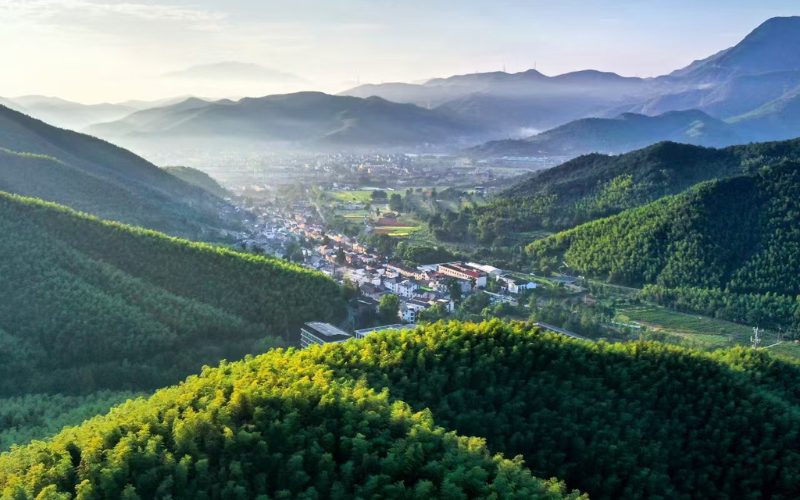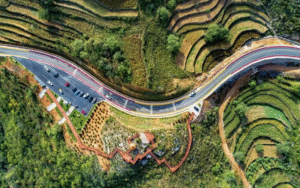Yucun’s Transformation: Showcasing China’s Green Development Path on National Ecology Day

HUZHOU, CHINA – September 2, 2025 – On August 15, a series of activities were held across China to mark the country’s third National Ecology Day, with a strong emphasis on ecological protection, climate action, and the role of meteorological departments in addressing environmental challenges. This year, Yucun Village in Anji County, Zhejiang Province, stood at the center of attention, becoming a national symbol of ecological progress.
The spotlight on Yucun coincided with the 20th anniversary of the concept “Lucid waters and lush mountains are invaluable assets”, a guiding principle for China’s green development. Visitors from around the world traveled to the village where the idea was first articulated, exploring how a community once reliant on resource extraction transitioned into a model of sustainability.
From Mining Hub to Green Pioneer
In the 1980s and 1990s, Yucun thrived as Anji’s wealthiest village thanks to its rich limestone reserves. However, extensive mining left deep scars: blasting disturbed wildlife, and dust from sand and gravel polluted the air. When the village decided to close its mines and cement plants, many doubted the future. Yet, that decision laid the foundation for a transformation that would redefine not only Yucun but also serve as a reference for China’s green development path.
At the entrance of the village, a stone stele engraved with the phrase “Lucid waters and lush mountains are invaluable assets” stands as a symbol of its new direction and development model.
Building “Greater Yucun”
Since 2020, Yucun has expanded beyond its original boundaries. By collaborating with neighboring villages, it formed a 43-square-kilometer cluster, which later grew to 245 square kilometers by the end of 2022. The “Greater Yucun” framework now encompasses one town, two townships, and 23 villages, evolving into a cross-regional development hub.
According to Xu Jinjing, head of Tianhuangping Town, the transition began with rural guesthouses and rafting activities, what he describes as “Version 1.0” of green development. Today, “Greater Yucun” is moving toward “Version 2.0,” focusing on industrial clusters in new economy sectors, cultural tourism, and modern agriculture.
The results are evident. In 2024, villages under “Greater Yucun” reported an average collective operating income of 2.82 million yuan, an 11.5% increase from the previous year. Green energy has also become a hallmark, with the Tianhuangping and Changlongshan pumped storage power stations contributing a combined 3.9 million kilowatts of capacity.
A Growing Community and Tourism Hub
What was once a village of just over 1,000 residents now forms part of a community of more than 40,000 people. Tourism has flourished: in 2024, Yucun alone welcomed 1.22 million visitors, while the “Greater Yucun” area received more than 10 million.
The appeal extends beyond tourism. Nearly 80,000 people have registered as “virtual villagers” online, with around 6,000 adopting farmland digitally to participate in local development. Businesses are also finding new opportunities. Duan Yi, CEO of Photoplus, relocated his company headquarters to Yucun, describing the local environment and government support as “more appealing than any urban office building.”
Preserving Ecology While Advancing Development
Despite rapid expansion, Yucun has kept its ecological foundation intact. In 2021, the World Tourism Organization recognized it as one of the first “Best Tourism Villages.” Its landscapes range from lotus ponds and historic temples to scenic cycling roads and bamboo forests reminiscent of scenes from Crouching Tiger, Hidden Dragon. Cultural events also highlight its transformation – last year, French pianist Richard Clayderman performed in an abandoned mine, blending art with nature.
Stories of personal relocation further illustrate Yucun’s appeal. Zhuo Li, who moved from Shanghai, now operates a mountain biking business from a European-style villa. She cites the natural beauty and relaxed lifestyle as her reasons for choosing Yucun.
A Broader Influence
Yucun’s transformation has become a reference point for green development across China. The United Nations Environment Programme highlighted the “Lucid waters and lush mountains” principle in a 2016 report. Today, hundreds of ecological demonstration zones and green development bases across the country trace their inspiration back to this small village.
From a mining community to a hub of ecological industry, Yucun has become a living example of how economic growth and environmental protection can progress together. As “Greater Yucun” continues to grow, it attracts new residents, entrepreneurs, and dreamers, adding new chapters to the story of harmony between people, industry, and nature.
Also Read
Swoopna Suman Teases Highly Anticipated Comeback
Thailand’s Secret Shores: 5 Island Gems Beyond Phuket
Buzz Expert’s 7 Fun Ways to Burn Calories Without a Treadmill




























